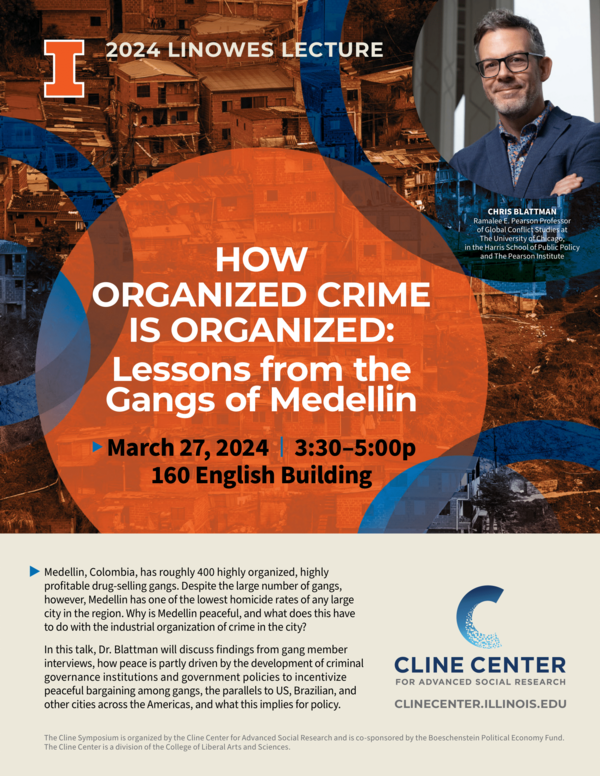Chris Blattman | 2024 Linowes Lecture: "How Organized Crime is Organized: Lessons from the Gangs of Medelin"

- Sponsor
- Cline Center for Advanced Social Research
- Views
- 236
2024 Linowes Lecture: Chris Blattman (Univ. of Chicago), “How Organized Crime is Organized: Lessons from the Gangs of Medellin”
ABSTRACT: Medellin, Colombia, has roughly 400 highly-organized, highly-profitable drug-selling gangs. Virtually every low- and middle-income neighborhood is under the control of one gang or another. In addition to selling drugs, many gangs also sell protection and consumer goods. Despite the large number of gangs and the enormous rents, however, Medellin has one of the lowest homicide rates of any large city in the region. Why is Medellin peaceful, and what does this have to do with the industrial organization of crime in the city? What can we learn about criminal market organization and the drivers of peace or conflict in cities across the Americas? To answer these questions, we interviewed more than 150 members and leaders of 80 drug-selling gangs and mafias. We also collected representative block-level data on gang activities, governance, and legitimacy. As in many cities in the US and Latin America, we document a hierarchy of criminal organizations, including a small number of mafia-like organizations who organize the street gangs and the drug industry through long-term relational contracts. Peace is partly driven by the purposeful development of criminal governance institutions, where the primary incentive is oligopolistic pricing and control of the retail drug market. Government policies have also helped to incentivize peaceful bargaining among gangs, strengthening mafia control, but preventing vertical and horizontal integration in the criminal sector. We discuss parallels to US, Brazilian, and other cities across the Americas, and what this implies for policy.
BIO: Chris Blattman is the Ramalee E. Pearson Professor of Global Conflict Studies at The University of Chicago, in the Harris School of Public Policy and The Pearson Institute. He also co-leads the university’s Development Economics Center and the International Policy & Development program at the Harris School. Blattman is an economist and political scientist who uses field work and statistics to study poverty, political engagement, the causes and consequences of violence, and policy in developing countries. He is a professor in the Harris School of Public Policy at the University of Chicago.